
MAMBO exhibition and educational program for 2024 is focused on recent debates and discussions around public monuments, revisiting and questioning colonial histories and traditions, fostering gender diversity and representation, and addressing resistance strategies against authoritarian gestures and the consolidation of collective progress ideals. For ARTBO Weekend our Museum will feature three exhibitions: No.1: ‘Chromophilia’ by Carlos Cruz-Diez (Venezuela), No.2: ‘Posture and Geometry in the Era of Tropical Autocracy’ by Alexander Apóstol (Venezuela-España), and No.3: ‘The Past is Never Dead. Is Not Even Past’ by Carlos Castro (Colombia), curated by Eugenio Viola. During ARTBO Weekend we will feature a conversation about memory and public monuments (guests still pending).
El Museo de Arte Moderno de Bogotá - MAMBO es una institución cultural líder en Colombia. Desde 1963 ha trabajado por investigar y promover el entendimiento del arte moderno y contemporáneo en su complejidad y diversidad, tanto en Colombia como internacionalmente. El MAMBO es un espacio pluricultural, dinámico e innovador que preserva y ofrece un entendimiento profundo de su colección mientras brinda a sus audiencias una experiencia significativa en torno al mundo del arte.
Además, el Museo ha consolidado un sólido departamento de educación que trabaja todos los días por hacer accesible el arte y la cultura a audiencias más grandes y diversas, mientras promueve la experimentación y la comprensión de las prácticas artísticas.
El Museo está basado en la convicción de que el arte y la cultura son piezas fundamentales para el desarrollo del país. Nuestras actividades tienen el objetivo de generar conocimiento en torno al arte, contribuyendo a mejorar el entorno cultural y artístico de la nación. Algunas de estas actividades incluyen exposiciones de reconocidos artistas nacionales e internacionales; paneles de discusión con profesionales de diversas disciplinas; talleres creativos; conversaciones con curadores, artistas, académicos y gestores culturales; proyecciones de cine, visitas guiadas y eventos especiales.
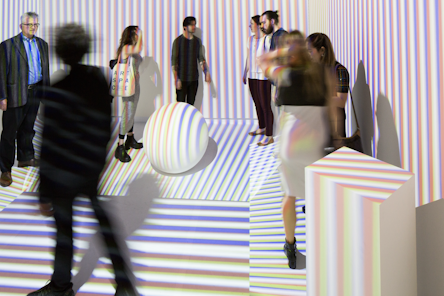
MAMBO presents Chromophilia, an exhibition that commemorates the centennial birth date of one the key referents of Latin American Op Art: Carlos Cruz-Diez (Caracas, 1923 – Paris, 2019). The Venezuela-born artist is internationally renowned for his explorations with light, color, and space. MAMBO joins worldwide institutions such as the Centre Pompidou (Paris, France), MACBA (Barcelona, Spain), ICAA, MFAH (Houston, Texas, USA), Museo de la Estampa y el Diseño (Caracas, Venezuela), Vassarely Foundation (Aix en Provence, France), Rainbow Space (Shanghai, China), among many others, in this hommage to one of the artistic figures with sharpest insight, sensible work and transforming legacy in Latin American modern art. 'Chromophilia' [from Greek, meaning intense passion / deep appreciation for color] is an exhibition conceived to celebrate the centenary of Carlos Cruz-Diez's birth and his long-term relationship with MAMBO while paying homage to Colombian private collections. Cruz-Diez’s research on physical, chromatic and luminous phenomena delves into the fundamental aspects of reality and contemplation. His large scale installations and public art commissions turned his work into modernist visual icons of Latin American urbanism which embodied the ideals of progress, industrialization and prosperity chased by all nations in the continent.
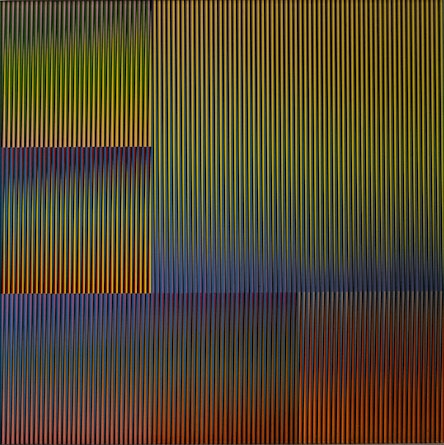
MAMBO presents Chromophilia, an exhibition that commemorates the centennial birth date of one the key referents of Latin American Op Art: Carlos Cruz-Diez (Caracas, 1923 – Paris, 2019). The Venezuela-born artist is internationally renowned for his explorations with light, color, and space. MAMBO joins worldwide institutions such as the Centre Pompidou (Paris, France), MACBA (Barcelona, Spain), ICAA, MFAH (Houston, Texas, USA), Museo de la Estampa y el Diseño (Caracas, Venezuela), Vassarely Foundation (Aix en Provence, France), Rainbow Space (Shanghai, China), among many others, in this hommage to one of the artistic figures with sharpest insight, sensible work and transforming legacy in Latin American modern art. 'Chromophilia' [from Greek, meaning intense passion / deep appreciation for color] is an exhibition conceived to celebrate the centenary of Carlos Cruz-Diez's birth and his long-term relationship with MAMBO while paying homage to Colombian private collections. Cruz-Diez’s research on physical, chromatic and luminous phenomena delves into the fundamental aspects of reality and contemplation. His large scale installations and public art commissions turned his work into modernist visual icons of Latin American urbanism which embodied the ideals of progress, industrialization and prosperity chased by all nations in the continent.
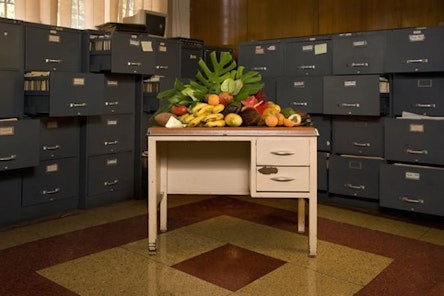
Posture and Geometry in the Era of Tropical Autocracy is an anthological exhibition of the Venezuelan-born Spain-based artist Alexander Apóstol (Barquisimeto, 1969). The show is concerned with national identities associated to sex and gender, explores the urbanistic and industrial failure of modernist ideals in Latin America, and establishes a critical analysis of the aesthetic processes of political processes in a tropical region increasingly leaning towards autocracy. Since 1990, the work of the Venezuelan artist Alexander Apóstol has revealed the different codes of gender, race and identity that accompany the ideologies of Latin America, incorporating the colorful, optimistic imaginary of modernization as well as the catalog of corporeal, sexualized fantasies of the continent’s nationalisms and populisms. His work oscillates between Venezuela’s dichotomous traditional visuals: on the one hand, the historicist, nativist vision developed by realist painters—patronized by the Marcos Pérez Jiménez dictatorship—which has been prolonged by the tragicomic staging of the current Bolivarian regime, and on the other, constructivism’s utopia of energetic, corporeal reinvention during the oil boom, from 1960 to 1970. After being exhibited at the Centro de Arte 2 de Mayo in Madrid, Spain; the Fundación PROA in Buenos Aires, Argentina; and the Museo Universitario de Arte Contemporáneo de Ciudad de México, Mexico; MAMBO presents the artist’s first institutional show in Colombia. The international collaboration and itineracy of the show ratify its dramatic pertinence across a continent that faces repeated waves of populism in each election cycle.
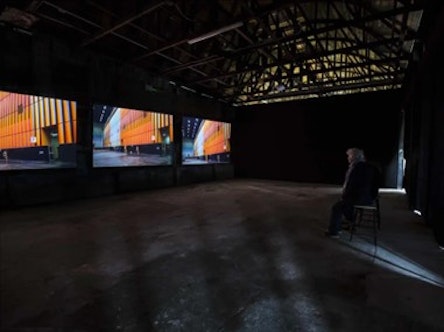
Posture and Geometry in the Era of Tropical Autocracy is an anthological exhibition of the Venezuelan-born Spain-based artist Alexander Apóstol (Barquisimeto, 1969). The show is concerned with national identities associated to sex and gender, explores the urbanistic and industrial failure of modernist ideals in Latin America, and establishes a critical analysis of the aesthetic processes of political processes in a tropical region increasingly leaning towards autocracy. Since 1990, the work of the Venezuelan artist Alexander Apóstol has revealed the different codes of gender, race and identity that accompany the ideologies of Latin America, incorporating the colorful, optimistic imaginary of modernization as well as the catalog of corporeal, sexualized fantasies of the continent’s nationalisms and populisms. His work oscillates between Venezuela’s dichotomous traditional visuals: on the one hand, the historicist, nativist vision developed by realist painters—patronized by the Marcos Pérez Jiménez dictatorship—which has been prolonged by the tragicomic staging of the current Bolivarian regime, and on the other, constructivism’s utopia of energetic, corporeal reinvention during the oil boom, from 1960 to 1970. After being exhibited at the Centro de Arte 2 de Mayo in Madrid, Spain; the Fundación PROA in Buenos Aires, Argentina; and the Museo Universitario de Arte Contemporáneo de Ciudad de México, Mexico; MAMBO presents the artist’s first institutional show in Colombia. The international collaboration and itineracy of the show ratify its dramatic pertinence across a continent that faces repeated waves of populism in each election cycle.
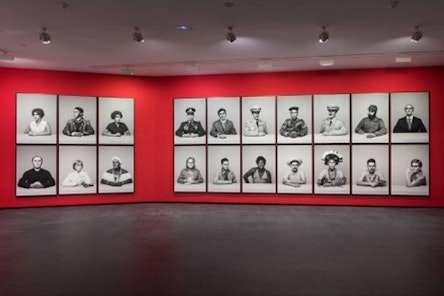
Posture and Geometry in the Era of Tropical Autocracy is an anthological exhibition of the Venezuelan-born Spain-based artist Alexander Apóstol (Barquisimeto, 1969). The show is concerned with national identities associated to sex and gender, explores the urbanistic and industrial failure of modernist ideals in Latin America, and establishes a critical analysis of the aesthetic processes of political processes in a tropical region increasingly leaning towards autocracy. Since 1990, the work of the Venezuelan artist Alexander Apóstol has revealed the different codes of gender, race and identity that accompany the ideologies of Latin America, incorporating the colorful, optimistic imaginary of modernization as well as the catalog of corporeal, sexualized fantasies of the continent’s nationalisms and populisms. His work oscillates between Venezuela’s dichotomous traditional visuals: on the one hand, the historicist, nativist vision developed by realist painters—patronized by the Marcos Pérez Jiménez dictatorship—which has been prolonged by the tragicomic staging of the current Bolivarian regime, and on the other, constructivism’s utopia of energetic, corporeal reinvention during the oil boom, from 1960 to 1970. After being exhibited at the Centro de Arte 2 de Mayo in Madrid, Spain; the Fundación PROA in Buenos Aires, Argentina; and the Museo Universitario de Arte Contemporáneo de Ciudad de México, Mexico; MAMBO presents the artist’s first institutional show in Colombia. The international collaboration and itineracy of the show ratify its dramatic pertinence across a continent that faces repeated waves of populism in each election cycle.
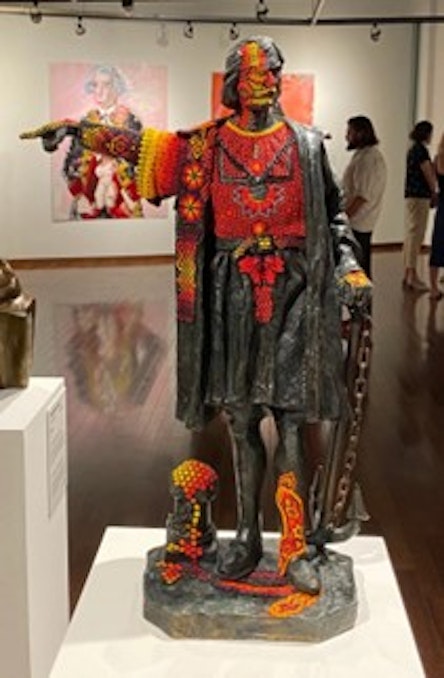
Colombian artist Carlos Castro Arias presents The past is never dead. Is not even past, his first institutional solo show in Bogotá where he proposes a dialog between the different figures, idols and historical referents that have agglutinated the Colombian national narrative. Calso also demonstrates his obsession for the historical figures and foundational events, hijacking their appearance to question their current meaning. The show gathers figures like Simón Bolívar, Hugo Chávez, Álvaro Uribe, Pablo Escobar, Gonzalo Jiménez de Quesada, Cristopher Columbus or the Spanish Catholic Monarchs, in a transgenerational inquiry on national identitary myths. The past is never dead. Is not even past is an infamous quote by William Faulkner, which results particularly relevant for Castro’s oeuvre as it addresses past events, conflicts, symbolisms and traumas that continue to exert influence in the present. Carlos Castro (Bogota, 1976) is a Colombian artist and musician. His practice focuses on historical images as well as symbolic and formal recontextualization of found objects. He has a BA at the Universidad Jorge Tadeo Lozano (2002) and earned a Fulbright Scolarship to study an MFA in painting at the San Francisco Art Institute (2010). Castro has held exhibitions in countries such as Brazil, France, México, New Zealand, Peru, Spain, Sweden, The United States, among others.
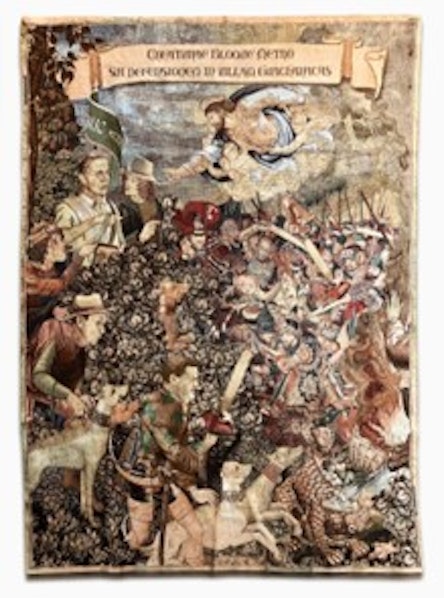
Colombian artist Carlos Castro Arias presents The past is never dead. Is not even past, his first institutional solo show in Bogotá where he proposes a dialog between the different figures, idols and historical referents that have agglutinated the Colombian national narrative. Calso also demonstrates his obsession for the historical figures and foundational events, hijacking their appearance to question their current meaning. The show gathers figures like Simón Bolívar, Hugo Chávez, Álvaro Uribe, Pablo Escobar, Gonzalo Jiménez de Quesada, Cristopher Columbus or the Spanish Catholic Monarchs, in a transgenerational inquiry on national identitary myths. The past is never dead. Is not even past is an infamous quote by William Faulkner, which results particularly relevant for Castro’s oeuvre as it addresses past events, conflicts, symbolisms and traumas that continue to exert influence in the present. Carlos Castro (Bogota, 1976) is a Colombian artist and musician. His practice focuses on historical images as well as symbolic and formal recontextualization of found objects. He has a BA at the Universidad Jorge Tadeo Lozano (2002) and earned a Fulbright Scolarship to study an MFA in painting at the San Francisco Art Institute (2010). Castro has held exhibitions in countries such as Brazil, France, México, New Zealand, Peru, Spain, Sweden, The United States, among others.
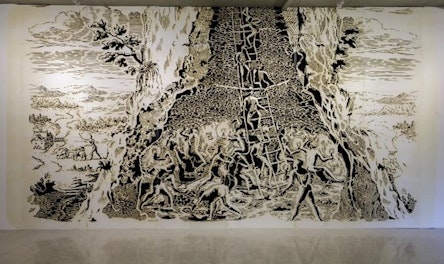
Colombian artist Carlos Castro Arias presents The past is never dead. Is not even past, his first institutional solo show in Bogotá where he proposes a dialog between the different figures, idols and historical referents that have agglutinated the Colombian national narrative. Calso also demonstrates his obsession for the historical figures and foundational events, hijacking their appearance to question their current meaning. The show gathers figures like Simón Bolívar, Hugo Chávez, Álvaro Uribe, Pablo Escobar, Gonzalo Jiménez de Quesada, Cristopher Columbus or the Spanish Catholic Monarchs, in a transgenerational inquiry on national identitary myths. The past is never dead. Is not even past is an infamous quote by William Faulkner, which results particularly relevant for Castro’s oeuvre as it addresses past events, conflicts, symbolisms and traumas that continue to exert influence in the present. Carlos Castro (Bogota, 1976) is a Colombian artist and musician. His practice focuses on historical images as well as symbolic and formal recontextualization of found objects. He has a BA at the Universidad Jorge Tadeo Lozano (2002) and earned a Fulbright Scolarship to study an MFA in painting at the San Francisco Art Institute (2010). Castro has held exhibitions in countries such as Brazil, France, México, New Zealand, Peru, Spain, Sweden, The United States, among others.